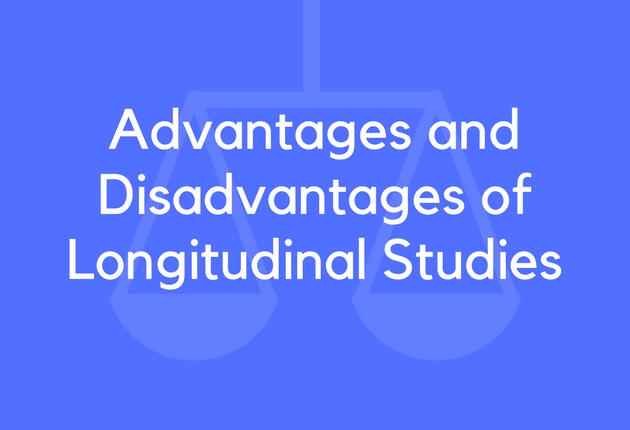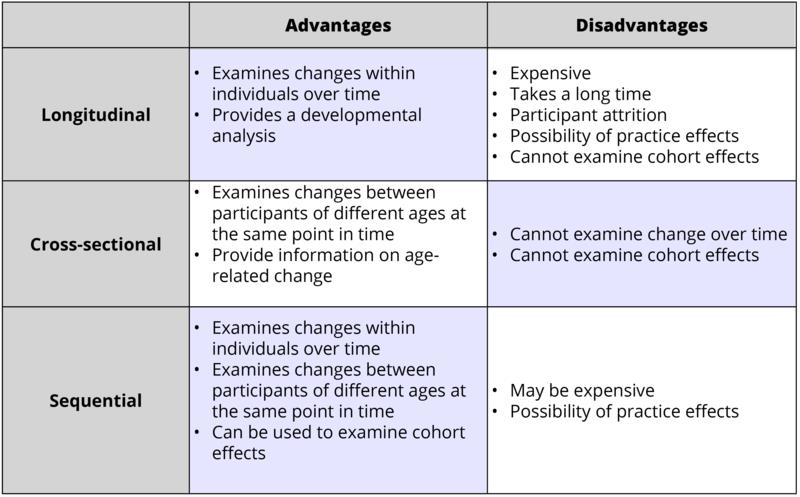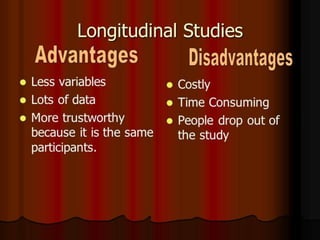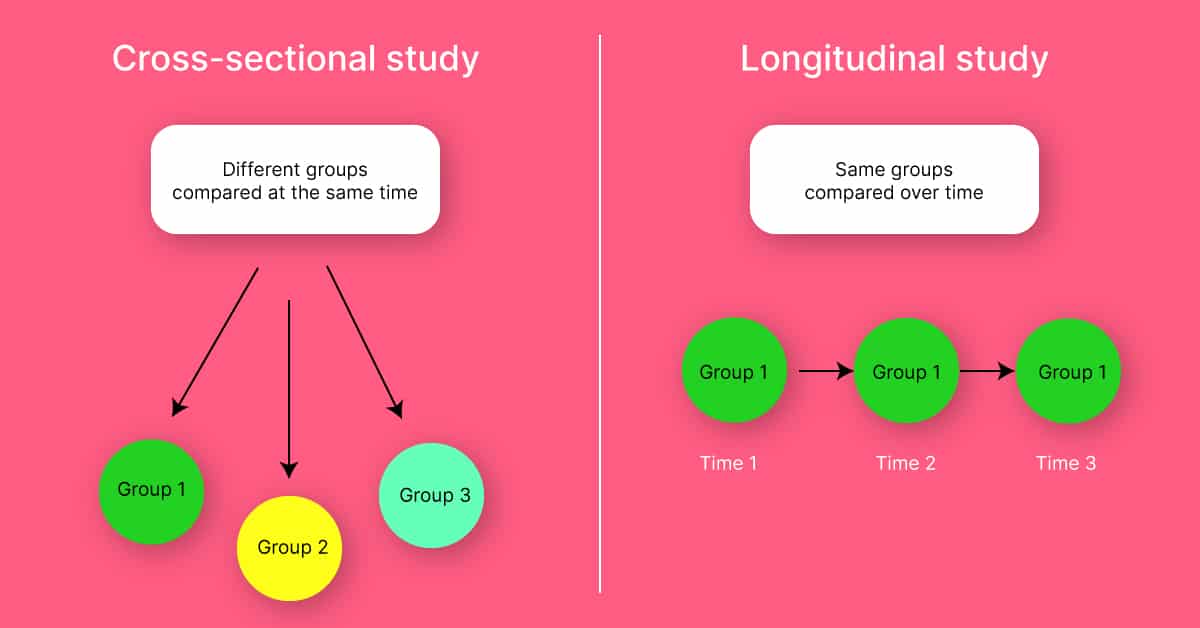Longitudinal studies are better to establish the correct sequence of events identify changes over time and provide insight into cause-and-effect relationships but they also tend to be more expensive and time-consuming than other types of studies. According to Newman 2010 longitudinal studies allow researchers to follow their subjects in real time.

Comparison Of Advantages And Disadvantages Between Longitudinal Download Scientific Diagram
Top Disadvantages of Longitudinal Studies 1.

. A longitudinal study is done at regular intervals over a long period of time. Advantage -- Takes much less time. They require huge amounts of time.
The Millennium Cohort study for example suggests a clear correlation between poverty and its early impact on low educational achievement. Advantages and disadvantages Advantages Longitudinal cohort studies particularly when conducted prospectively in their pure form offer numerous benefits. In a longitudinal study you can keep track of these variables in real time.
Longitudinal studies are a research design which requires repeated observations of the same variables over specific time periods. 17 Longitudinal Study Advantages and Disadvantages. By making comparisons over time they can identify causes.
Say for instance you have two thousand. Disadvantage -- Expensive and time consuming Cross-Sectional Study. Disadvantages -- Younger people might differ from older people in ways other than age.
Longitudinal studies rely on the expertise creativity and honesty of individual researchers for authentic conclusions. That reliance on the individual makes it possible for the data to be corrupted or conclusions to be inaccurate. There is a factor of unpredictability always present.
Whether social mobility improves through generations of the same family. Whilst this did show the long term effects the method is time consuming. The ability to identify and relate events to particular exposures and to further define these exposures with regards to presence timing and chronicity.
Often requires fewer participants since only one group is. A disadvantage of longitudinal studies is that it is hard to keep the sample intact over time if participants are not committed to the project eg. Apr 1 2019 by Editor in Chief.
If you are going to study a group of 1500 participants once a year then obviously some of these participants will no longer be able to be part of the study. Cross-sectional studies miss fewer data points. Advantage -- Comparing the same people at various ages.
Like any other research design longitudinal studies have their advantages and disadvantages. Longitudinal Study Advantages and Disadvantages Advantages It is easier to control for cohort effects since only one group is involved. List of Disadvantages of Longitudinal Studies.
Because longitudinal studies involve the same subjects over a long period what happens to them outside of the data collection moments can influence future data being collected. They are often large-scale quantitative surveys and tend to be used by positivists although some studies for example the Seven Up study which followed 14 kids from the age of 7 every 7 years as they grew up are more qualitative and preferred by interpretivists. This study longitudinally investigated bilingual advantages on episodic memory recall verbal letter and categorical fluency during the trajectory of life.
They provide a unique set of benefits but they also have some drawbacks. List of Advantages of Longitudinal Studies. Simon task and applying cross-sectional designs.
Disadvantages Longitudinal studies are time-consuming and often more expensive than other types of studies so they require significant commitment and resources to be effective. There are some distinct advantages to each type of research some of which we have already discussed. Not a snapshot - shows changes in attitudesbehaviours over time - results more valid.
That is individual differences are. The format allows one person to influence the outcome of the study. One disadvantages of longitudinal study is the occurrence of panel attrition.
They may choose to withdraw. Follows a group of people as they age. The strengths of longitudinal studies They allow researchers to trace developments over time rather than just taking a one-off snapshot of one moment.
They can show clear variable patterns over time. With longitudinal designs we have one main advantage. One key advantage of performing longitudinal studies is their ability to show patterns of a variable over time which is a very powerful way through which researchers come to learn about the relationships of cause and effect.
The study lasted for 2 years looked at the way children learn to communicate. Suggest two disadvantages of longitudinal studies in sociological research 4 marks A main disadvantage of longitudinal studies is panel attrition. Under most situations it is treated as a.
These may be shorter examinations or designed to collect long-term data. What Are the Disadvantages of Longitudinal Studies. Time is definitely a huge disadvantage to any longitudinal study as it typically takes a substantial amount of time to collect all the data that is required.
Advantages and Disadvantages of Longitudinal research. Some people may choose to stop participating in the research. This is a good way to learn more about relationships having cause-and-effect.
Disadvantages of longitudinal research - the data may be too demanding for researcher and participants - sample attrituiton - takes a lot of time and money and commitment -in longitudinal studies - Issues and concepts may change over time. The advantage of using longitudinal study is that researchers can determine the patterns regarding a variable in a particular length of time. The processes involved with cross-sectional studies reduce the risk of missing critical data points.
Researchers have the ability to maximize their examination of the available information at any time because there are no time variables included in this work. Typically studies of cognitive advantages in bilinguals have been conducted previously by using executive and inhibitory tasks eg. Also it takes equally long periods to gather results before the patterns can even start to be made.
An advantage of longitudinal studies is that they analyse how variables change over time eg. Advantages and disadvantages of longitudinal studies. Data collected at 1 time that compares people of different ages.
What are the pros and cons of a longitudinal study.

23 Advantages And Disadvantages Of Longitudinal Studies Brandongaille Com

Methodological Issues Themes In Psychology Snapshot Study Snapshot Study Takes Place At Just One Point In Time Potentially With One Participant For Ppt Download

17 Longitudinal Study Advantages And Disadvantages Connectus

11 Advantages And Disadvantages Of Longitudinal Studies Futureofworking Com

Methodological Issues Themes In Psychology Snapshot Study Snapshot Study Takes Place At Just One Point In Time Potentially With One Participant For Ppt Download

Research Involving Time Spans Lifespan Development

Advantages And Disadvantages Of Multicentre And Longitudinal Imaging Download Table


0 Comments